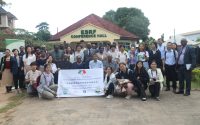Government of Tanzania Emphasizes AGRF 2023 as a Landmark for Food System Transformation
The imminent Africa Food Systems Forum 2023 in Dar es Salaam, elucidated by the Honourable Minister Hussein Bashe, promises to be a watershed moment in the global discourse on food systems. Anticipated outcomes include cementing Africa’s leadership in this arena, innovative collaborations, and the generation of actionable insights tailored for the continent’s unique challenges, with Tanzania poised as a paradigm of transformation.
From September 4th to 8th, Dar es Salaam is set to become the epicenter of a pivotal global gathering. Esteemed world leaders, pioneering entrepreneurs, distinguished scientists, and the linchpins of agriculture — the farmers — will converge for the Africa’s Food System’s Forum (AGRF) 2023 Summit. This occasion is particularly resonant for Tanzania, as it marks the nation’s second opportunity to host, following the widely-acclaimed 2012 assembly in Arusha.
For the Tanzanian government, this is more than a summit. It’s a strategic confluence poised to sculpt impactful alliances and foster synergistic partnerships that dovetail with their ambitious roadmap for a holistic food system overhaul. The summit’s theme, “Recover, Regenerate, Act: Africa’s Solutions to Food Systems Transformation,” is not just a tagline but a clarion call echoing Tanzania’s commitment to combat hunger and fortify its agricultural bulwark against endemic poverty.
Highlighting agriculture’s indomitable role in Tanzania’s economic framework, the minister cited its contribution to nearly a third of the country’s annual GDP — a metric that resonates across the African continent. The 2023 forum, as envisaged, promises to serve as a crucible for refining global financial strategies. Attendees will critically appraise existing financial frameworks, gauging their adaptability and efficacy in addressing the multifaceted challenges unique to Africa.
Broadening the narrative, Minister Bashe steered the discourse to encompass the holistic dimensions of food security and sovereignty. The former encompasses the universal guarantee of accessible, wholesome sustenance, while the latter advocates for nations’ autonomy in shaping agricultural paradigms, grounded in their distinct cultural, societal, and economic fabric.
The minister underscored Tanzania’s relentless pursuit of these ideals, who spotlighted recent endeavors such as rejuvenating dormant horticultural entities in Arusha. Moreover, he illuminated the nation’s agricultural finance sector’s robust trajectory, underscored by a remarkable 54.1% surge in lending to the sector in the previous year.
Further accentuating the narrative was the minister’s emphasis on the indispensable roles of youth and women. He highlighted innovative initiatives, such as the forward-thinking “Building a Better Tomorrow: Youth Initiative for Agribusiness (BBT-YIA),” crafted to galvanize and empower these critical demographics.
Minister Bashe has also beckoned global delegates to the upcoming summit, portraying the forum as a nexus of change, an embodiment of Africa’s collective resolve, and an envisioning of an Africa that stands tall, leading the world in food system transformation.


